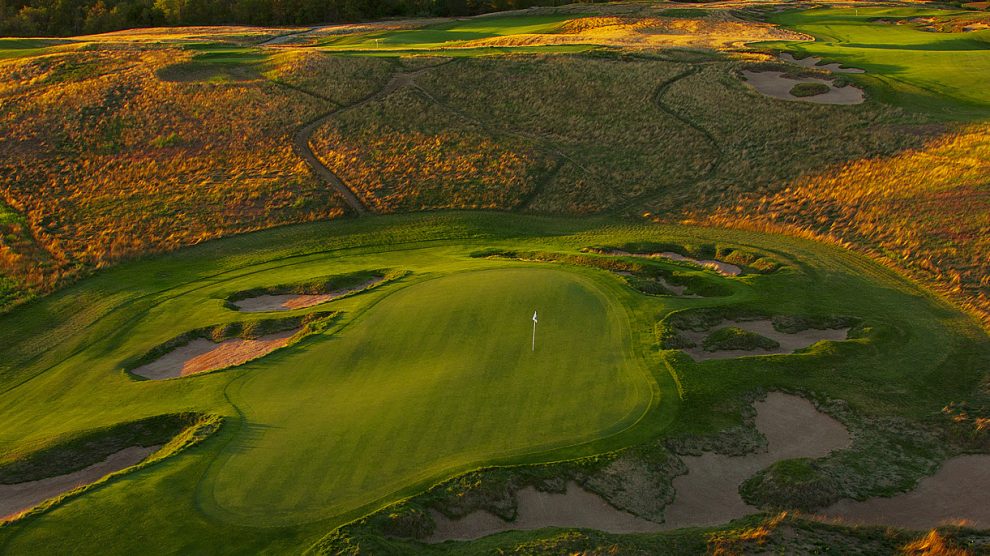ERIN, Wis. – The collection of one-shot holes at Erin Hills is as strong as we’ve ever seen at any U.S. Open. Both nine and 16 are downright iconic -- instant classics. Both holes also prove that length is overrated.
The ninth green is completely encircled by bunkers, including several narrow trenches just wide enough to stand, but, in places, to narrow to take anything but an abbreviated swing. It’s a mere 165 yards (and downhill as well) at most but the swirling winds make the tiny green a difficult target.
The 16th green is a sliver, a portion of which is invisible from the tee box, also surrounded on three sides by both trench and blowout bunkers. And at the 185-yard 16th there might even be a blind pin, depending on which tee and hole location are used.
“Is that a blind pin?” one player asked when he got to the tee box on Monday. The flag was not visible behind the towering fescue-covered knoll. Upon being told that, for that round, it was, he asked, “They wouldn’t do that to us during the tournament, would they?”
I doubt the USGA would, but we can all dream, can’t we?
In the meantime, let’s take a walk through history and examine some of the greatest par 3s in U.S. Open history.
PEBBLE BEACH – Nos. 7 and 17
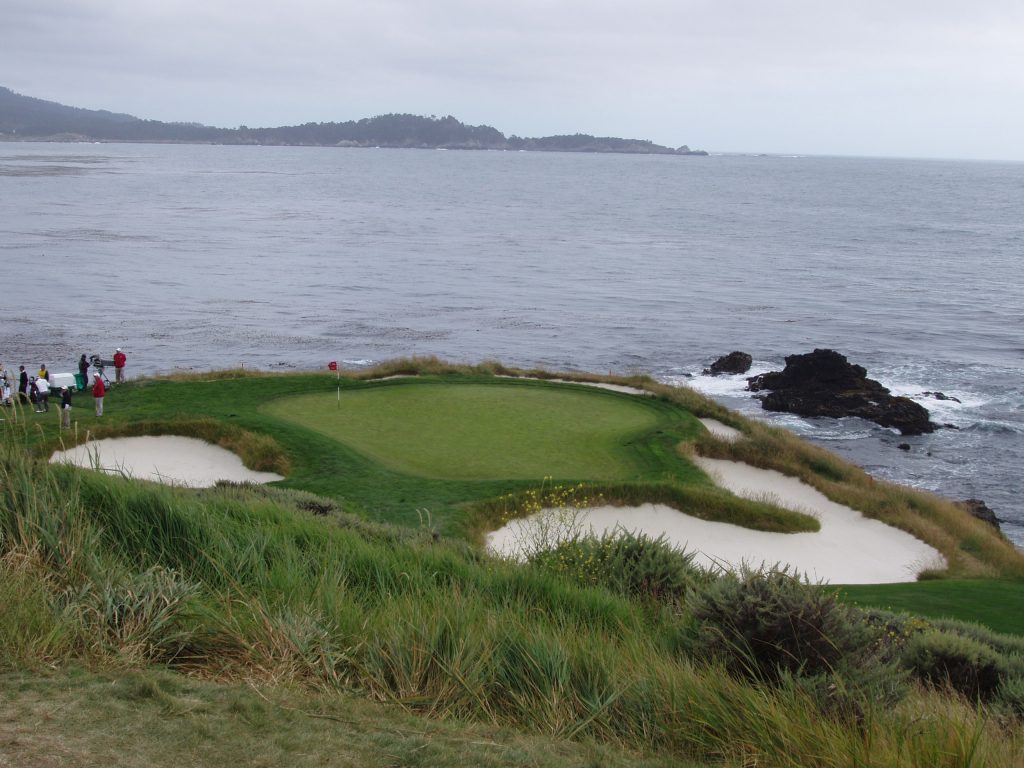
Pebble has two of the best par 3s on Earth: seven and 17. They couldn’t be any different from one another, too. Seven holds the distinction of being the shortest hole in U.S. Open history; it played a mere 99 yards in 2010. Even so, with the waves crashing against the surf just off to the right of the narrow green and the wind whipping off the ocean, the pros can play anything from a wedge to a 5-iron and card anything fro a 2 to a 7.
No. 17, almost twice as long as seven yardage-wise, has been the scene of golf history time and again, most notably in 1972 when Jack Nicklaus hit the pin with a 1-iron on Sunday en route to winning, then again 10 years later when Watson chipped in for birdie to take a 1-shot lead over Nicklaus. The tiny hourglass-shaped green is surrounded by some of the deepest rough on the course, and the scoring swings that can result
CHAMBERS BAY – No. 9

I’m sick of all the bellyaching about Chambers Bay, and you should be too. Here’s an authentic links – you can run the ball onto nearly every green and the fescue fairways bleed perfectly seamlessly into the greens – and yet because of one bad break with weather and conditioning, people decide they don’t like it and campaign against it getting another Open. I call foul.
Two of their par 3s are both stunning visually and interesting strategically. The drop-shot ninth features a green segmented into three distinct tiers. Watching the ball soar against the majestic backdrop of Puget Sound is as thrilling a site anywhere in the world.
WINGED FOOT WEST No. 10
“It’s like trying to hit a 4-iron into someone’s bedroom window," Nicklaus famously lamented during the infamous “Massacre at Winged Foot” in 1974. Some architecture experts wonder if this wasn’t a modified version of a A.W. Tillinghast template called a “Reef Hole,” featuring a long bunker extended well in front of the green that needs to be played over or around.
During tournaments like the Anderson Memorial Fourball and the various Winged Foot club championships and invitationals, playoffs begin at the 10th.
MERION – No. 13
Phil Mickelson, the Wizard of Wedge, had his money club in his hands and a share of the U.S. Open lead, but the football-shaped is the smallest on the course, and Phil left his second best chance to win the Open at a hole measuring a scant 100 yards.
RIVIERA COUNTRY CLUB – No. 6
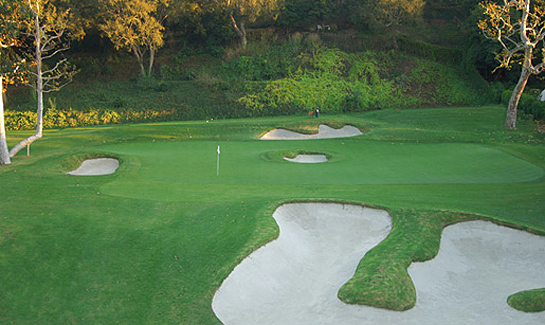
Anytime I ask why we can’t go back to Riviera for another major I get the excuse that “Well, they have a regular tour stop, so we can't…”
Two words: Quail Hollow.
What’s not to like about Riviera? The storied history of Hogan in ’48? The masterful George Thomas architecture? Or the all but incomparable setting amidst the ravines?
The there’s the sixth hole – the par 3 with the bunker in the middle of the green. The bunker essentially divides the green into four tiny greens in one. Build that now and everyone will burn you in effigy, but when it’s at a Golden Age masterpiece, well that’s a different story. And here’s a stat to consider over your morning coffee: It has more four-putts than any other hole on the PGA Tour.
GARDEN CITY – Nos. 2, 12 and 18
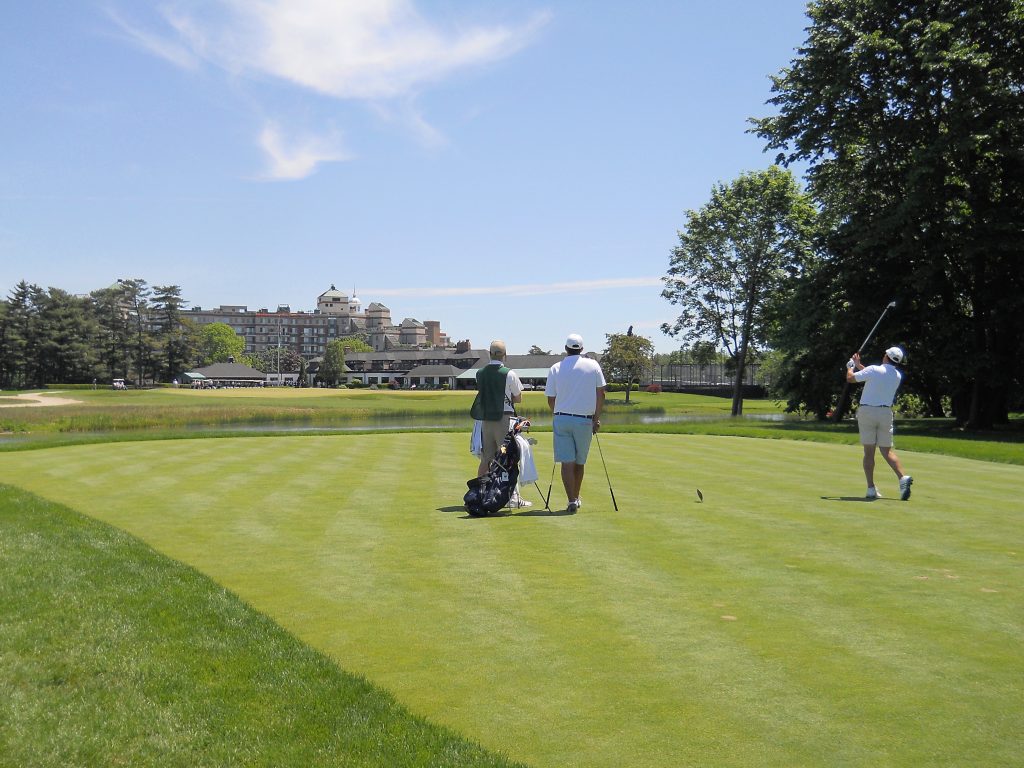
“Wait a minute! Garden City?” you ask. “When did Garden City host a U.S. Open?" It was 1902 and it was won by Laurie Auchterlonie.
“Only three par 3s?” you ask. Yes, and they are routed asymmetrically too, appearing at 2, 12 and 18. Each of them is a museum piece. The 130-yard second hole is all carry over a sandy quarry to an oval green set up from back left to front right. Th 12th recently had its controversial, but eminently fun mounds restored within the green itself by no less a personage than Tom Doak. And 18 is one of the greatest finishing holes in the world, America’s prettiest Eden hole with the Garden City hotel and the clubhouse as the backdrop. Scull one and you’re likely to spill a member’s Dark and Storny…the veranda is an extension of the green
COUNTRY CLUB OF BUFFALO – No. 6
Here’s another Golden Age masterpiece that, sadly, too few people get to see. A gorgeous Ross brilliantly restored by Ron Forse, the par-3 sixth features an island green surrounded by fall-offs on all sides. It’s like trying to hit a 7-iron into the crater of a volcano.
SHINNECOCK HILLS - No. 7
I would be remiss if I didn’t mention number seven at Shinnecock Hills, perhaps the most infamous par-3 in U.S. Open history. It’s a textbook example of an excellent Redan hole, with its green sloping off on all sides. Sadly, former USGA set-up maven Tom Meeks thought it would be funny to burn the green to cinders during the 2004 U.S. Open. The result was an unplayable hole: No iron shot could hold the rock hard green, and no rolling ball could stay on the putting surface.
Shinny missed one spot in the informal rotation, because the members needed to send a message about respecting the club, the game and the U.S. Open. This isn’t a carnival barker penny-pitch game, but that’s exactly what Meeks gave us all on Championship Sunday that year. Happily, we return next year. With Mike Davis at the helm, look for a sparkling tournament and a bold, but fair seventh.
PLACES WITH PAR 3s THAT ARE U.S. OPEN WORTHY
PINE VALLEY – Nos. 3, 5, 10 and 14
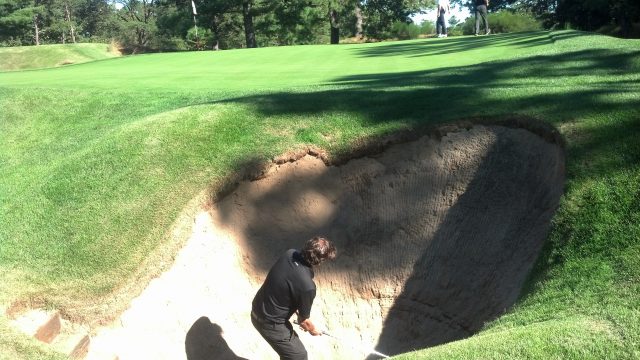
It’s perennially voted No. 1 in America year in and year out on every rankings list and with good reason. Every hole is memorable, and the collection of par 3s is, arguably, the best in the country. The third, with its sandy waste, is one of the most copied holes in the world. Five has been called “the easiest par 5 in America,” all carry over water to a green featuring a false front, setting up for a draw with a fairway wood or long iron.
And then there’s 10, with the famous Devil’s Asshole bunker…
FORSGATE COUNTRY CLUB (N.J.) – Nos. 3, 7, 12 and 17
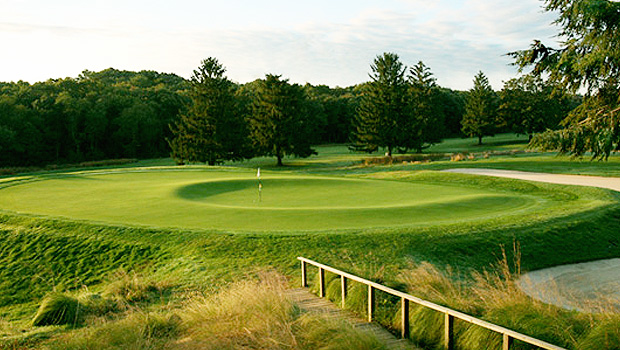
If there is one course in the country that has par 3s rivaling Pine Valley’s, it’s Forsgate’s Banks Course, named for its architect Charles “Steamshovel” Banks. The last course designed by the Bloodline of Macdonald, Raynor and Banks, they threw the kitchen sink, the piano, the dresser and the armoire into the design. All four major Bloodline templates are here, including the hardest Eden hole in the World, a classic Biarritz that stretches to 272 yards (and the green is 84 yards long!) and a perfect horseshoe in the “Short” at 12.
ENGINEERS - 14a
“What the hell is a ‘14a?’” you ask. Engineers has 19 holes. Two par 3s rotate in and out of play. One of them is called the “2 and 20” hole. It’s pint-sized, but it will sink your scorecard with no compunctions. It’s only 120 yards, but the narrow sliver of green drops off steeply into gunch on three sides, while the left side is guarded by a bunker. When Bobby Jones and Gene Sarazen played it together in the same group in the 1919 PGA, they took an 11 and a 10, respectively.

